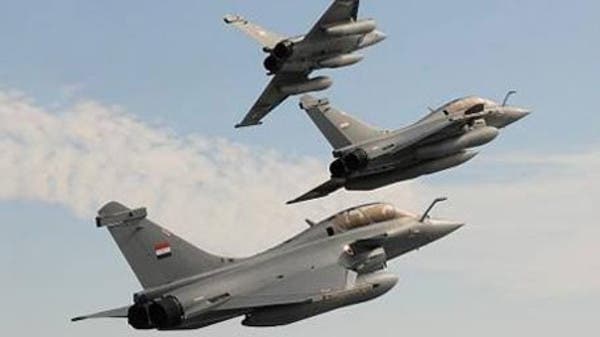Distracted Egypt
"Most of the Egyptian air force today are MiG-21s which wouldn't last long in an engagement."Three Rafale fighter jets carrying Egyptian flag (Photo: Egypt's army spokesman offical Facebook page)
"With the Shaheen missiles, they [new French Rafale fighter jets] can attack from a distance with a much lower chance of collateral damage."
"As countries around them begin to disintegrate, these missiles could give them [Egypt military] power to influence events in these countries."
Ben Moores, senior defence analyst, Jane's Defense Weekly
"The Islamic State in Sinai is a strategic partner with Hamas [which controls the Gaza Strip]. The enemy of Egypt is a partner with the enemy of Israel and that creates a joint interest between Israel and Egypt."
"But how we actually execute or build on that joint interest is something I'd rather not discuss."
Dore Gold, director-general, Israeli Foreign Ministry, Jerusalem
"People feel their standard of living has deteriorated. It's now a regular occurrence that water and electricity can be cut off at any time without notice."Egypt is facing a double threat; restive Egyptians whose brand of Islam is closely aligned to that of the Muslim Brotherhood, agitating ever since the overthrow of Mohammad Morsi, and causing destabilization through covert activity in tandem with the Brotherhood and its offshoot militia Hamas, in the Gaza Strip. They both have more than ample allies in the Salafist Bedouin tribes and the presence of an aggressive Islamic State agency operating out of Sinai, reflecting the position that al-Qaeda used to monopolize, though they're there, as well.
"There's also a lack of security There's more street crime, more robberies, more car-jackings. People don't feel safe in the street anymore."
Maye Kassem, American University of Cairo
The entire Sinai strip has become a hotbed of 'resistance' to the rule of Egypt and the police and military have become frequent targets of deadly suicide attacks. Add to that the problems surfacing in Libya with yet another ISIL branch morphing out of local Islamists and Egypt recognizes it has a multi-pronged menace lurking within and at its borders.
Egypt sees France's sale of its high-priced and effective late-generation jet fighters as a sign of the country's support for President Abdel Fattah el-Sissi whose relations with the United States have been less than supportive. The U.S. administration had invested its hope and trust by some strange alchemy of dissonant understanding of the Middle East situation of volatility aided and abetted by the Brotherhood, that they would be agents of moderation.
The contract between the two countries includes an advanced frigate, the FRE-MM, now in the possession of Egypt's navy and named "Long Live Egypt", a nod to President el-Sissi's favourite benediction. Egypt's alarm over the growing threat of Islamic State in the peninsula where in the last few months terrorists have slaughtered dozens of Egyptian police officers, gives it confidence with the possession of these technically updated jets and missiles.
The 'feel-good' aspect of the missiles stop at their use in Sinai; ineffective in an environment where a wide spread of Islamists threaets exists over a large area making targets difficult to pinpoint. Not so in Yemen and particularly Libya where possessing such updated missiles will give the Egyptian airforce both confidence and the capability to respond to pending threats.
Egypt's president has more than enough concerns he must address. The external challenges to Egypt aside, the domestic problems the country faces represent another hurdle. Freedom of the press has been impacted, and demonstrations by disaffected Egyptian activists have been curtailed. The Egyptian Centre for Economic and Social Rights claims that 41,000 people have been detained, charged or sentenced between 2013 and 2015.
Human rights groups point to 210 members of the Muslim Brotherhood appearing to have disappeared. Prisons are overcrowded, and everyday life for Egyptians remains difficult with civic infrastructure becoming unreliable, and the fear of crime becoming more rampant than ever before. Like Israel, attempting to cope with domestic and exterior hostility and violence, Egypt's attention is diverted from administering the affairs of the country to defending itself from volatile outside sources of destabilization.
Labels: Conflict, Egypt, Islamism, Libya, Muslim Brotherhood, Sinai, Social-Cultural Deviations


<< Home